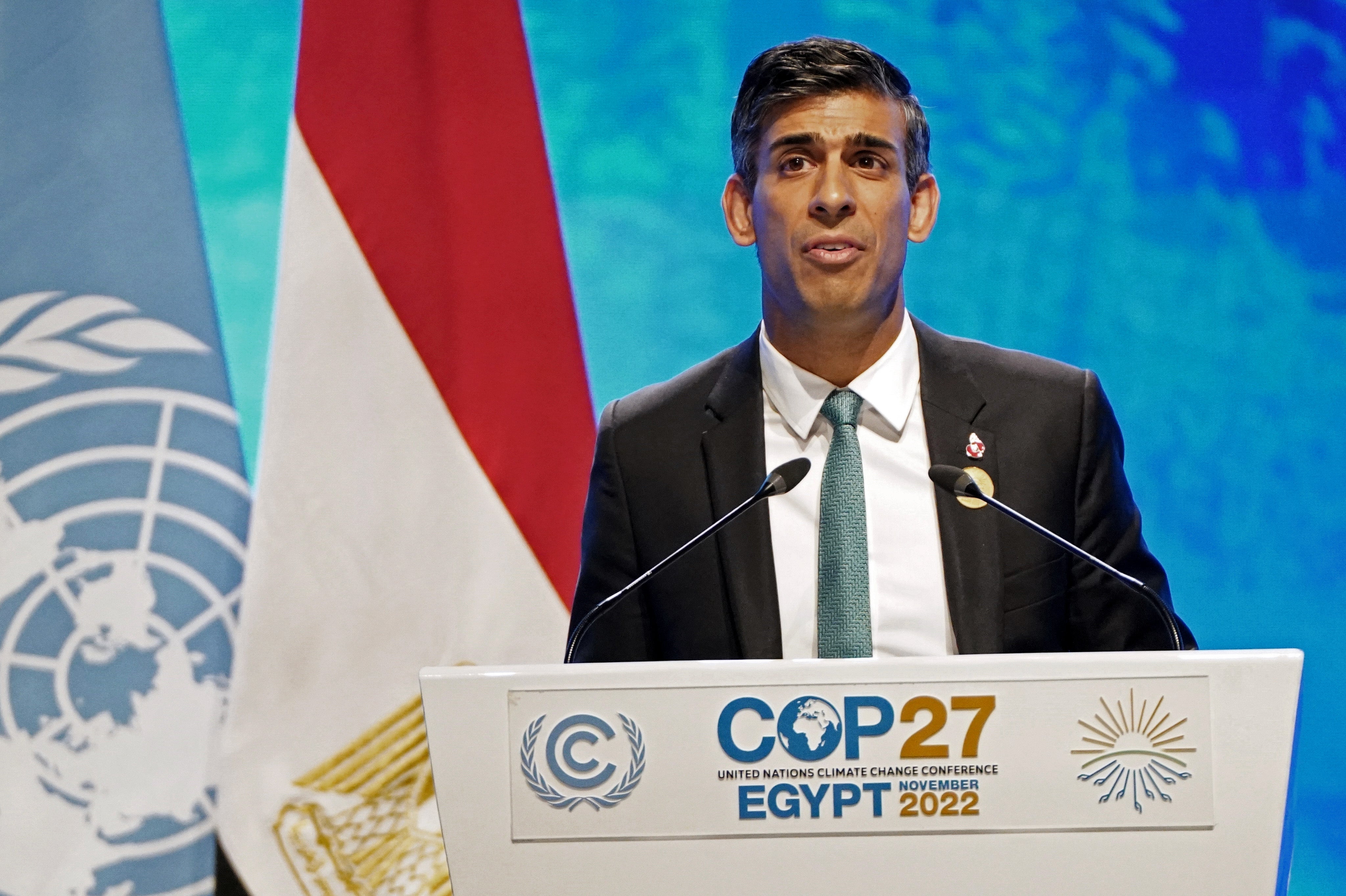When it comes to green policies, Rishi Sunak is colour blind
Unlike his predecessor Boris Johnson, the PM’s commitment to the environment is flimsy at best, writes Andrew Grice


Rishi Sunak is still haunted by the ghost of Boris Johnson, as Partygate and now Chris Pincher – the two scandals which brought down the former prime minister – remain in the headlines, scuppering a frustrated Sunak’s attempts to move on.
While most Conservative MPs regard the Johnson regime as disastrous and welcome the relative stability under Sunak, there’s a growing recognition among them that Johnson did better than Sunak in one area. Not Ukraine, on which Sunak has matched his unwavering support – but climate change.
Sunak is no climate denier but is just “not interested," as Tory peer Zac Goldsmith told Channel 4 News a week after his resignation as a minister with a parting shot at the prime minister’s “apathy” on the issue.
This matters because it sends a signal to other ministers and the civil service that the issue is not a top priority. One Whitehall insider told me: “It was an open secret when Rishi was at the Treasury that he wasn’t interested. He was very reluctant to spend money on net zero. But it didn’t matter so much because there was leadership from No 10 [under Johnson]. It matters now because everyone takes their cue from the top.”
Sunak’s default position on climate change is to say his two daughters are “passionate environmentalists”. That might have been (just about) acceptable during last year’s Tory leadership election, but it’s not enough for a PM.
In a revealing email to Tory supporters this week, Sunak said the environment is “important to all of us”, but devoted the rest to attacking Just Stop Oil and Labour’s tenuous links to it – a quick diversion to the safer Tory territory of public order. Before Keir Starmer’s speech on education was interrupted by two green campaigners yesterday, he had already condemned Just Stop Oil’s actions. Although Labour would delay its £28bn-a-year of green investment spending until the second half of a five-year term if it wins power, the party would provide the leadership the country is now lacking.
Why doesn’t Sunak do it? Most Tories suspect it’s instinctive. Net zero wasn’t among his five pledges, and probably wouldn’t have made the cut if he had issued 10. He will judge (correctly) there are more votes in the economy, health and small boats, but that doesn’t mean there are no votes in the environment. The centre-right think tank Onward has warned the Tories would pay “a heavy political price” for cooling on the net zero by 2050 target, which is backed by two in three voters.
Sunak’s instincts were laid bare when he decided not to attend Cop27 in Egypt to focus on “the depressing domestic challenges” on the economy, but then went at the last minute when it emerged that Johnson would show up. The PM also raised eyebrows by missing an important summit on finance for low- and middle-income countries in Paris last month.
His government has approved the UK’s first deep coal mine for 30 years, while progress on onshore wind remains painfully slow. Although the government denies reports it will miss its pledge to contribute £11.6bn to a global climate fund, Whitehall officials admit privately it will struggle to meet its original timescale.
Some Tories suspect Sunak’s reluctance to champion tackling climate change stems from his desire not to alienate rebel right-wing MPs who, after dragging the UK out of the EU, have found a new bete noire in net zero. However, his own brand of climate scepticism was evident before he became PM.
The government’s green advisers, the Climate Change Committee, have noticed the difference between Johnson and Sunak, warning the UK has gone backwards in the past year and is in danger of missing key targets.
Tory MPs are increasingly critical of the PM. Theresa May, who wrote the net zero pledge into law, warned that “where the UK once led, we are now falling behind”. Chris Skidmore, who reviewed the net zero target for the government, told the Institute for Government: “You’ve got to keep on making the case, and at the moment there is a vacuum and silence …That’s the challenge – if you’re not willing to show leadership, someone else will” – whether it be the “climate delayers and detractors”, or Labour.
Philip Dunne, chair of the Commons environmental audit committee, told the PM at this week’s liaison committee hearing that “the ambition for net zero remains, but delivery has slowed over the past year under your prime ministership”.
Sunak allies argue Johnson’s commitment to green issues was “a performance”. Not true: although the rhetoric was not always matched by policies, Johnson’s conversion was real.
The Sunak camp insists that policy is unchanged. The PM told Dunne the US and Europe are “catching up” after the UK’s fast start on green investment, but the reality is that the UK is now falling behind and in danger of missing a huge opportunity for economic growth and jobs. The irony is that this would help Sunak overcome those “depressing domestic challenges” on the economy – yet he is colour blind when it comes to green.






Join our commenting forum
Join thought-provoking conversations, follow other Independent readers and see their replies
Comments